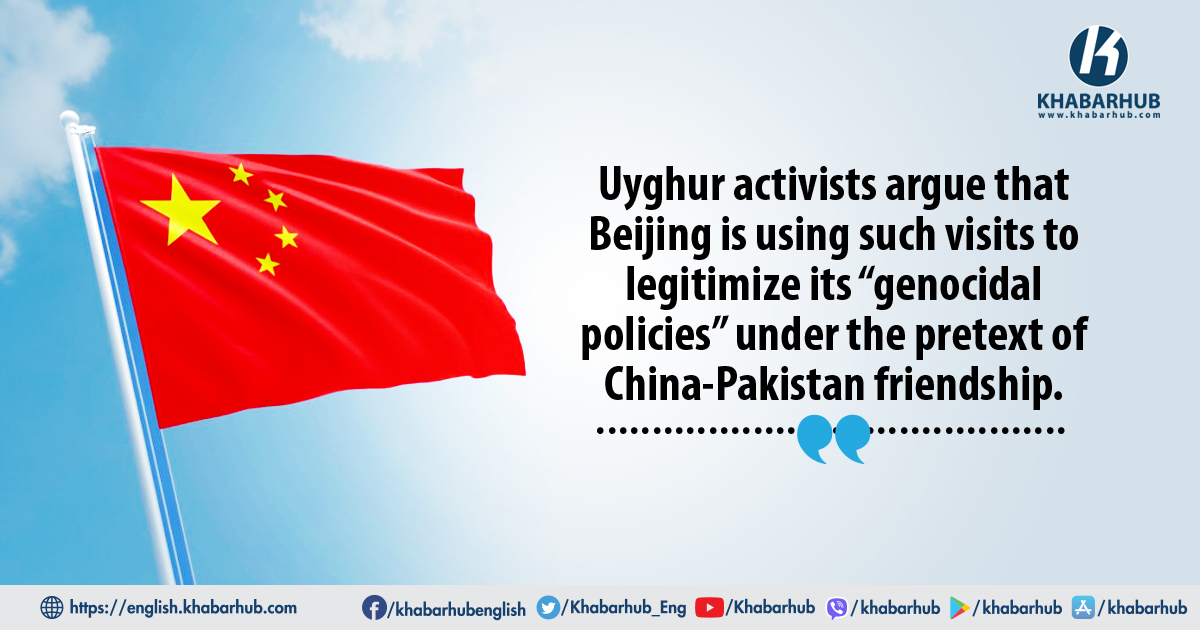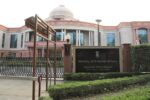Pakistan has become embroiled in yet another controversy after a group of ten local businessmen praised China’s policies in the restive Xinjiang province.
These businessmen were sent to Xinjiang on an eight-day trip as part of China’s narrative-building campaign aimed at countering criticism of its treatment of the marginalized Uyghur Muslim community.
For years, Pakistan has supported Chinese propaganda in Xinjiang, which shares an international border with the occupied Gilgit-Baltistan region.
However, Uyghur activists have criticized Pakistan for sending these businessmen—most of whom were ethnic Uyghurs—to Xinjiang to echo Beijing’s official line.
As expected, the businessmen ignored China’s blatant oppression of the roughly 12 million Uyghur Muslims living in the region during their visit.
This incident is yet another example of the growing China-Pakistan alliance in suppressing human rights and freedom of expression for Muslims in Xinjiang, which stands in stark contrast to their official positions on the Palestine issue.
In Rawalpindi, around 100 Uyghurs who fled to Pakistan through Afghanistan years ago are still at risk of deportation to either China or Afghanistan, due to Pakistan’s reluctance to grant them citizenship under pressure from China.
Meanwhile, both countries are also claiming to support Bangladesh Jamaat-e-Islami (BJI), an Islamist party, following the controversial collapse of the elected Awami League (AL) government in Dhaka on August 5.
This apparent hypocrisy from Beijing and Islamabad regarding the treatment of Muslims in Xinjiang and Palestine should raise concerns among BJI members and supporters in Bangladesh.
The true motivation behind China and Pakistan’s backing of the BJI is questionable and may shift based on selfish interests and the emerging political situation in Bangladesh.
China’s treatment of Uyghur Muslims in Xinjiang has drawn widespread international condemnation, with reports of severe human rights abuses.
The Chinese government has implemented policies that many describe as systematic repression against the Uyghurs, including mass detention and re-education camps, strict surveillance and control, forced population control, among others. Therefore, to hide these state-backed atrocities against Uyghurs and growing international criticism, Beijing organizes regular scripted and properly vetted visits of foreign governments’ officials and nationals to the region. The recent trip of Pakistani businessmen was organized by the Ex-Chinese Association Pakistan, established in 2007 with China’s support “to promote the welfare of the Uyghur community in the country.”
Members of the Pakistani business delegation began posting on social media in both Urdu and English as soon as they arrived in Xinjiang on August 20.
The Chinese media expectedly covered the delegation’s visit, claiming that they observed ‘peace, stability, economic development, religious harmony, and cultural prosperity in the region’.
Abdul Aziz, a Uyghur businessman from Gilgit who participated in the trip, shared short videos on Facebook titled “Xinjiang Trip Diaries,” documenting the business delegation’s visits to exhibitions on counterterrorism and anti-extremism, the International Grand Bazaar, the Islamic Institute of Xinjiang in Urumqi, as well as various tourist sites.
In social media posts, the delegation claimed to have witnessed Uyghurs and other Muslims living happily and peacefully in Xinjiang, emphasizing that China was actively developing the region.
They dismissed Western media reports of Chinese atrocities against Muslims in the province.
The posts also featured musical performances and statements that “Muslims of all ethnicities are living happily in Xinjiang.”
The Chinese government has been organizing such trips for delegations from mostly Islamic countries to counter allegations of crimes against humanity in the region.
This was the first time that a foreign delegation, including ethnic Uyghurs from a Muslim-majority country like Pakistan, was invited to the restive province.
Moreover, Uyghur activists argue that Beijing is using such visits to legitimize its “genocidal policies” under the pretext of China-Pakistan friendship.
In a rare visit to China’s Xinjiang province in October 2023, former caretaker Pakistan Prime Minister Anwaar-ul-Haq Kakar followed a longstanding pattern of Pakistani leadership by avoiding any mention of the reported mass incarceration of Uyghurs and other Muslim minorities in the region.
Successive Pakistani governments have consistently refrained from acknowledging these human rights abuses.
During his visit, Kakar did not address the allegations of repression in his official statement.
This approach mirrors former Prime Minister Imran Khan’s stance in October 2021, when he dismissed claims of Chinese abuses in Xinjiang, stating that “the version of what is happening in Xinjiang is completely different to the version we hear from Western media and governments.”
Now, both China and Pakistan are actively engaging with Bangladesh’s Jamaat-e-Islami (BJI) and other Islamist parties, pretending to be allies of the Muslim community to advance their own selfish interests in Bangladesh.
As a close strategic partner of China and a Muslim-majority country, Pakistan has played a key role in shielding Beijing from international criticism regarding its treatment of Uyghurs, offering tacit support in global forums.
This has allowed China to largely avoid facing broader censure from the Muslim world over the issue.
Several international human rights organizations and media reports indicate that an estimated 1.8 million Uyghurs have been detained in concentration camps scattered across Xinjiang, where the local Muslim population continues to live in fear.
In Pakistan, nearly 1,000 Uyghur families, whose ancestors migrated from Xinjiang 50 to 60 years ago, reside in Gilgit and Rawalpindi.
However, these families remain stateless, as they have not been granted Pakistani citizenship.
In Rawalpindi, around 100 Uyghurs who fled to Pakistan through Afghanistan years ago are still at risk of deportation to either China or Afghanistan, due to Pakistan’s reluctance to grant them citizenship under pressure from China.
It is strange that, as an Islamic country, Pakistan hesitates to grant citizenship to persecuted Muslims from Xinjiang, despite frequently pressuring other Islamic nations and the Organization of Islamic Cooperation (OIC) on the Palestine issue.
Similarly, Beijing has positioned itself as an “advocate for peace,” calling for an immediate ceasefire in Gaza and the establishment of an independent Palestinian state following the Israel-Hamas conflict in October 2023.
Now, both China and Pakistan are actively engaging with Bangladesh’s Jamaat-e-Islami (BJI) and other Islamist parties, pretending to be allies of the Muslim community to advance their own selfish interests in Bangladesh.
However, it will be difficult for them to conceal their blatant hypocrisy on the Uyghur issue, which BJI and other parties should be wary of.









Comment